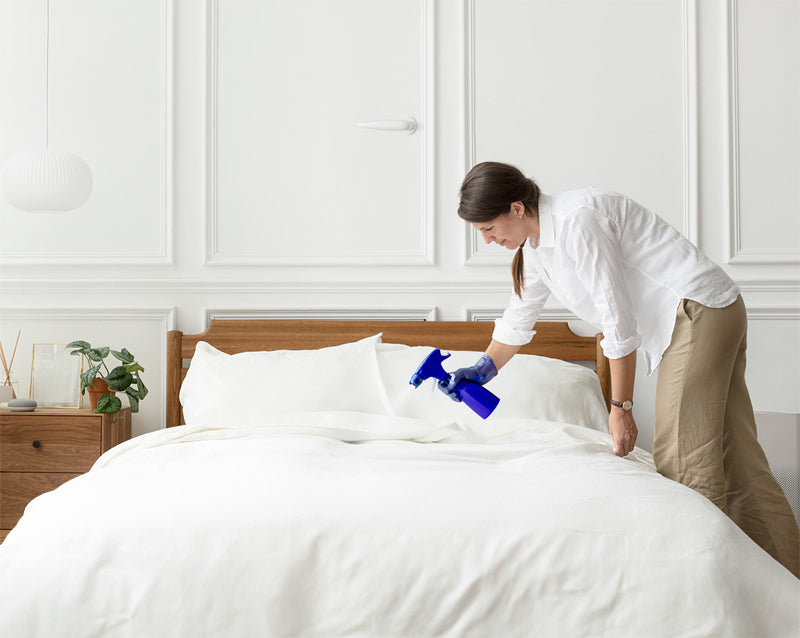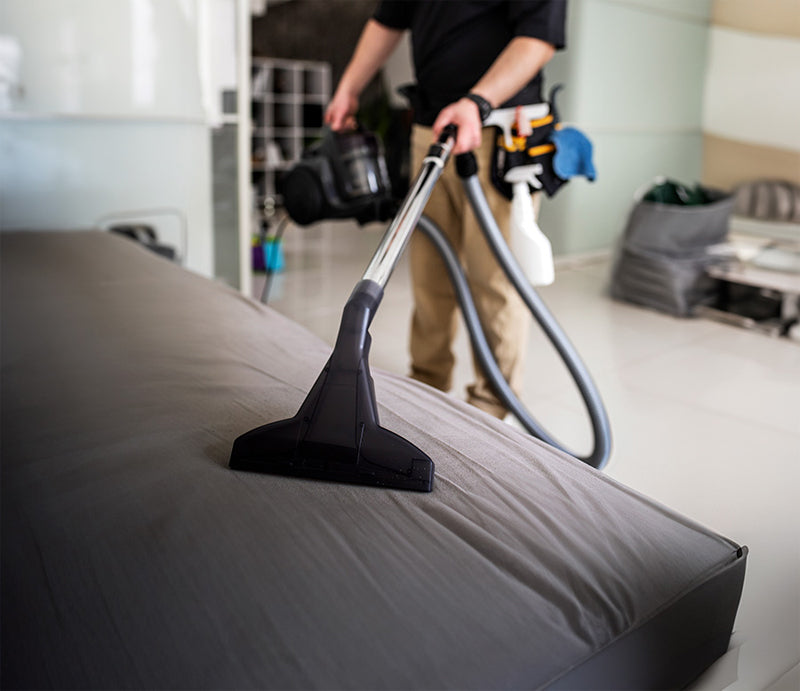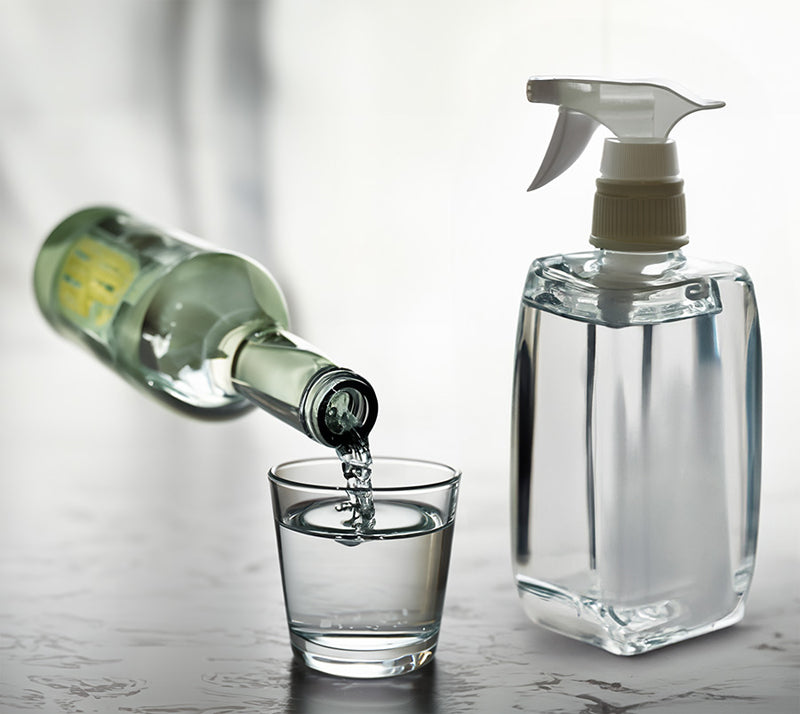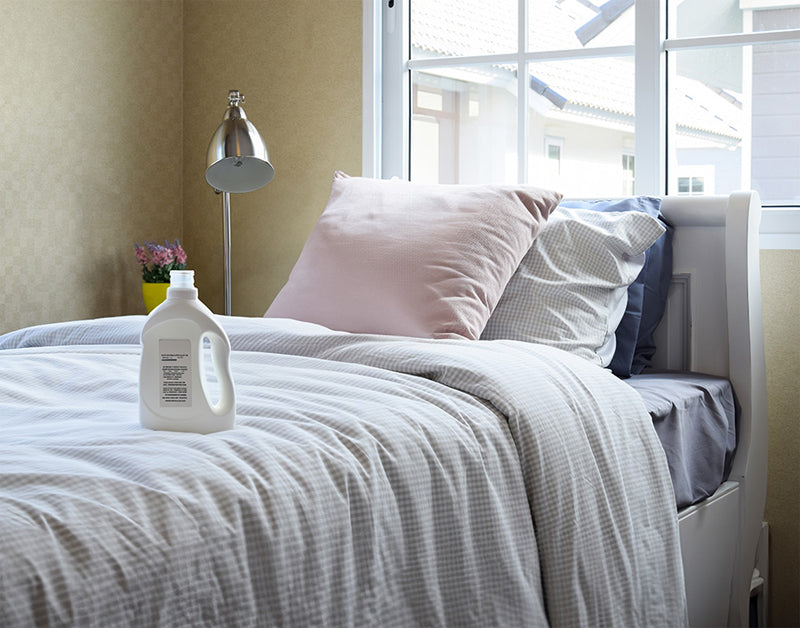No Products in the Cart
Zulekha Nishad, based in India, is a skilled content specialist, copy editor, and creative content writer with a Master's degree in English Language and Literature. Read more
Last Updated October 17, 2025
You've had a long, tiring day, and all you want to do is get into your bed and shut your eyes. But as you lay down, you notice an unpleasant and persistent odor from your mattress. It's a situation that can quickly turn a sanctuary into a source of discomfort, leading to poor sleep and a less-than-pleasant bedtime experience.
But there's good news though! In this article, we're going to get straight to the point about how to deal with this all-too-common issue: mattress odors. We'll provide practical tips and insights on how to deodorize a mattress and and keep it fresh and clean. Let's start!
Key Takeaways:

The way your mattress smells can make a big difference in your sleep quality and overall health. Here are a few reasons why mattress deodorization is so important:
A clean and pleasantly-smelling mattress creates an inviting and relaxing sleep environment. Lingering odors can disrupt your night's sleep, making it challenging to unwind and thus compromising the overall quality of your rest.
Over time, mattresses accumulate dust, sweat, dead skin cells, and allergens. Deodorizing your mattress is a vital step in eliminating these potential health hazards, reducing the risk of allergies, respiratory problems, and skin irritations.
Unpleasant odors often stem from excess moisture, which fosters the growth of mold and mildew. These microorganisms not only produce disagreeable smells but also pose a risk to your mattress's structural integrity. Deodorizing is essential in preventing these issues and, as a result, prolonging your mattress's lifespan.
Odors can attract unwelcome guests, such as dust mites and bed bugs, which can adversely affect your health. Regular deodorizing and cleaning serve as deterrents to these pests.
Many mattress warranties require proper upkeep, including maintaining cleanliness and odor control. Neglecting these responsibilities can lead to warranty voiding, leaving you without coverage for potential defects.
When it comes to maintaining a clean and comfortable sleep environment, addressing mattress odors is a crucial aspect that often gets overlooked. Whether it's due to everyday wear and tear, unexpected spills, or just the passage of time, your mattress can develop odors that disrupt your sleep and overall well-being.
So, are you ready to explore some of the best ways to clean a mattress and deodorize it?

Let's start with an all-time favorite and incredibly effective deodorizing agent: baking soda. This household hero can absorb and neutralize odors like a champ. Simply sprinkle a generous amount of baking soda evenly across your mattress. Be thorough, ensuring an even distribution.
Give the baking soda at least 15 minutes to work its magic. During this time, it will absorb odors and moisture trapped within the mattress.
After the waiting period, use your vacuum cleaner equipped with an upholstery brush to carefully go over the entire surface of the mattress. Pay close attention to the seams and crevices, as odors tend to hide there. The vacuum will not only suck up the baking soda but also any dust, allergens, and, most importantly, the odors it has absorbed.

Your trusty vacuum cleaner isn't just for your floors; it's a great tool for keeping your mattress fresh, too. Swap out your regular vacuum cleaner head for the one with upholstery attachment. This specialized tool is perfect for tackling the softer surface of your mattress without causing damage.
Go over the entire mattress surface methodically. Start at one corner and work your way across the entire mattress, ensuring that you get into the seams and crevices where odors and dust tend to accumulate.
Depending on the severity of the odors or if you have pets, it might be necessary to vacuum your mattress more often. Doing so will not only eliminate odors but also reduce the buildup of dust mites and allergens.

For those stubborn, persistent odors or stains, the vinegar-water solution can work wonders. Mix equal parts of white vinegar and water in a spray bottle. This creates a balanced solution that is strong enough to break down odors and bacteria, while the water helps dilute the pungent vinegar scent.
Spritz the vinegar-water solution evenly over your mattress. Be cautious not to oversaturate; a light mist is sufficient.
Once done, allow the mattress to air dry completely. This can take a few hours, so plan accordingly. The vinegar will evaporate, leaving your mattress refreshed and odor-free.

When dealing with specific stains or soiled areas on your mattress, you can turn to laundry detergent. Mix a small amount with water to form a mild solution. Using a clean cloth or sponge, dip it into the soapy solution, then gently scrub the stained or soiled area on your mattress.
After you've removed the stain, rinse the area thoroughly with a clean, damp cloth. Allow the mattress to air dry completely. This step is crucial to ensuring no moisture gets trapped within the mattress.

Essential oils can be a fragrant, therapeutic solution to mattress odors. Select an essential oil with a fragrance you find pleasant. Popular choices include lavender, eucalyptus, tea tree, or any other oil of your preference.
Add a few drops of your chosen essential oil to a spray bottle filled with water. The number of drops depends on your preference for fragrance strength.
Spray the essential oil-water mist evenly over the mattress, allowing the oil to infuse the fabric. The essential oils will leave a lingering, pleasant scent that not only masks odors but also creates a calming and soothing atmosphere for bedtime.
A mattress protector is a valuable investment in safeguarding your mattress against potential spills, dust, allergens, and general wear and tear.
Look for a high-quality mattress cover that is easy to clean, waterproof, and breathable. It should offer a snug fit without altering the comfort of your mattress.
Weather permitting, open your windows and bedroom doors to facilitate cross-ventilation. Fresh air helps dissipate odors and prevents them from lingering around your mattress.
Make it a habit to air out your room every morning or during your daily routine. Even a few minutes of ventilation can make a significant difference.
Keeping humidity levels in check helps prevent mold and mildew growth, which can cause odors. Use a dehumidifier, if necessary.
Frequent washing of your bedding is crucial in maintaining a clean sleeping environment. Sheets, pillowcases, and blankets should be laundered regularly. Aim for at least once a week to keep them fresh.
Choose a good-quality detergent and follow the care instructions on your bedding. Opt for a detergent with a pleasant scent to enhance the overall freshness of your bed.
Include the box spring or foundation in your regular cleaning routine. Vacuum or dust it periodically to remove any dirt and allergens.
Check for any signs of mold or mildew on the supporting structure, especially if you've experienced moisture issues in your bedroom. Address any mold promptly to prevent odors and health concerns.
Say goodbye to the days of waking up to unpleasant odors emanating from your mattress. With the tips and techniques we've shared on how to deodorize a mattress, you can ensure your bed is not just comfortable but also consistently fresh and clean.
Regular maintenance and the use of natural household remedies like baking soda, white vinegar and water solution, essential oil, and more can work wonders in preserving your mattress's hygiene and comfort. So, enjoy a peaceful night's sleep on a mattress that smells as good as it feels!
It's all about keeping your sleep environment fresh and pleasant. We recommend deodorizing your mattress every few months, but let your personal situation guide you. If you have pets or allergies, you might want to do it more frequently to ensure a clean and odor-free sleeping space.
While scented sprays might provide a temporary fragrance boost, they don't address the root cause of odors.
For a more customer-friendly approach, we suggest focusing on natural deodorizing methods, as they not only freshen but also effectively eliminate unpleasant odors, ensuring a more comfortable and restful night's sleep.
We want to make sure you enjoy a clean and odor-free mattress for the long term. To achieve this, consider investing in a mattress protector – it's like a shield for your bed. Additionally, airing out your room regularly and maintaining good personal hygiene practices can create a fresh and welcoming sleep environment that promotes a better night's rest.
It's important to clarify that a mattress pad and a mattress topper serve different purposes than a mattress protector. While mattress protectors are designed to guard against spills, stains, and allergens, mattress pads and toppers focus on adding extra comfort and support to your mattress. So, it's advisable to use a dedicated mattress protector to safeguard your bed against potential damage and maintain its longevity.
If you don't have baking soda on hand or prefer an alternative approach, there are several options to consider. You can opt for a natural approach by using a mixture of water and white vinegar, which you can lightly spray on the mattress and allow to air dry. Essential oils, such as lavender or tea tree, can also be added to a water spray for a fragrant solution.
On a sunny day, taking your mattress outside to air out in the sunlight can work wonders. You can even use a fabric freshener spray or upholstery spray designed to eliminate odors.
Remember to allow your mattress to completely dry and air out after any treatment and vacuum it to remove any remaining particles.
Related blog posts:
1. How Often Should You Wash and Clean Your Sheets?
2. How to Clean a Mattress the Right Way?
3. How to Get Pee Out of a Mattress
4. How to Get Blood Out of Sheets?
5. How to Get Pee Smell Out of Mattress?
Disclaimer: What is said in this article has been referenced from multiple sources and is intended only for educational and informational purposes. Please note that no content in this article is a substitute for professional advice from a qualified doctor or healthcare provider. Always consult an experienced doctor with any concerns you may have regarding a health condition or treatment, and never disregard any medical suggestions or delay in seeking treatment because of something you read here.
Notify me when available
We will send you a notification as soon as this product is available again.
We don't share your email with anybody


